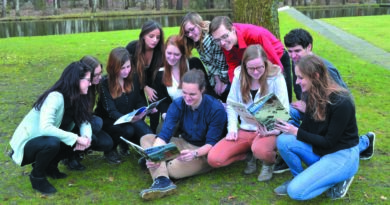The Online Education Evolution
Over the past year, a lot of changes in our education had to be rapidly implemented due to the COVID-19 crisis. Now over a year in, it seems time to do a short review. Hence, we did so with the head of our econometrics department: professor Herbert Hamers. Herbert is for most students better known as their cycling Limburgish ‘Introduction Analysis and Probability’ professor with his occasional ‘little jokes’. This positive vibe is something he definitely takes along to his more cloaked and serious responsibilities as head of the department. In this role, Herbert oversees the finances, staff, and education of both the Bachelor and Master econometrics programs. This mostly entails a lot of administrative work, but, especially in COVID-19 times, it asks for a bit of creativity from time to time. Of course, he does not do all of this alone. Especially with the education-related matters, he can count on the support from the academic directors who take the responsibility for the actual curriculum and Marieke Quant who is responsible for the allocation of the staff to all courses. The academic directors also have a place on the sounding board where student input is presented, among others, by our very own education committee of Asset | Econometrics. Written by Tamara Dert and Casper Heemskerk
Restructured education
Let us start with our education which had to be completely switched from offline to online in a matter of weeks. This has brought some difficulties, but Hamers pointed out some fine results as well. Hamers gave us some examples by telling stories about dr. Cristian Dobre, dr. Hannis Datta and professor Bart Dierynk. They all took, in a different way, the opportunity to restructure some of their courses. In their approach, the keywords were interactive feedback, flip the classroom, and engage the students (even on Zoom). Another advantage of the online environment is the absence of a time limit. From Hamers’ own experience, he was glad to take some more time for the topics that were more difficult in his course. Online education brought (or required) some creativity too. Many teachers have made video clips for the students about the course material that they can view at any time. As a result, they have gained more time during their actual ‘live’ lectures.
Despite the positive sides of online education, every teacher wants to go back to the normal on-campus lectures. The big downside of the online environment, according to Hamers, is the interaction with the students. Many of you would recognize the lectures with only a couple of students with their cameras on. Hamers said: “You cannot see the reaction on the material by the students. Normally in the lecture room, you immediately see if the students understand the material.” Although Hamers is rather positive about the possibilities with Zoom, he thinks that the conversations are not as fluent as face to face. It is almost impossible to interrupt. Hamers does see big differences between the teachers: some take this crisis as an opportunity to explore some new methods while others are more conservative and stay by their well-known approach. In the meantime, students and teachers will have to make the best of it together. Here are some Do’s and Don’ts to make it all a bit more pleasant and educational.
| DO’s | DON’Ts |
| Put your camera on and participate | Hesitate to interrupt or ask questions |
| Attend the Q&A sessions and tutorials | Ask technical questions during lectures |
| Watch the additional course material videos | Lose motivation |
Exam results
Last year, most of the students and teachers were at some point stressed about the examination. Online examination was completely new and questions were raised about the security and privacy of the examination. Hamers prefers examination on campus since it is easier, takes less time, and is much less susceptible to fraud. However, he does think that Proctorio is an adequate program that protects the validity of our diplomas. He stated that it could be an interesting possibility for students who are abroad on the examination date, to take the exam with Proctorio in a foreign country. The focus, however, should be that all faculties should uniformly approach the examination in the same way. In the exam period of last semester, some faculties dropped a few balls at fraud detection, whilst other departments including ours were primarily a bit hypersensitive at red flagging.
When undergoing such drastic changes, it is tensive what it will do with the results. Hamers and Henk Norde, the academic director of the EOR Bachelor, were especially worried about the first-year students. The university is a completely new environment for new students and this year, they also had to adapt to online education. On top of that, the results after the first unit were not as good as in previous years, as the Linear Algebra course was not the only course with a seriously low passing percentage. Therefore, the relief was big when the results after the second unit came in. These results were comparable with the previous years and the percentage of the students who will obtain a positive BSA-advice will be as high or even a bit higher than last year. Furthermore, the crisis does not seem to have an impact on the fraction of graduates. The results for the other year students are not yet in and are more difficult to track as Hamers truthfully states: “There are not just second-year students following second-year courses…” The hope is, however, that these students have a better knowledge of what is expected of them and will be able to adjust easier.
Future
How long this situation will last is still unknown, but a time will come when everything is possible on campus again. Many teachers would be relieved to finally see the students enter the lecture rooms and have some small talk with their fellow colleagues by the coffee machine. However, this period has absolutely delivered some great ideas and methods for the teachers. Since the material does not change every year for many courses, many pre-recorded clips on the material could still be available and relevant in the future. This could give the teachers more time to interact during the lectures or to give some clearer explanation about certain topics. Hamers is also very positive about the online accessibility. Q&A sessions are, for example, far more useful since students can come online for just ten minutes, which is a lot easier and more accessible for them than showing up to the real-life ones.
Did you know that there is a special committee that focuses on sharing student experiences with the Academic Director and Program Coordinator?In this so-called Education committee, there are two representative students for each year of the Bachelor. These students gather the feedback of all students that follow the Bachelor courses through questionnaires. At the end of every unit, there is a sounding board session in which the Education committee has a meeting with the Academic Director and the Program Coordinator. During this meeting, there is an open conversation in which the members of the Education committee talk about the student’s feedback, and the Academic Director and Program Coordinator explain the university staff’s perspective on these points. The students of the Education committee are always looking for more points of view about the courses in the Bachelor program, so if you have any feedback, please let us know by sending an email to info@Asset-Econometrics.nl!
Financial compensation
The Cabinet of the Netherlands is worried about the mental health of the students and argues that the lockdown is responsible for learning delay. To compensate for the possible delay, students only have to pay half of the tuition fee in the next year. However, proof of lower results has not arrived yet. When asked about it, Hamers questions if this compensation would help the students to improve their results and if it really helps for their mental health. Hamers added: “I admit that the quality of education has sometimes decreased last year but the teachers have worked twice as hard. Besides that, the compensation is for students in the upcoming year while those new students did not suffer from it during this year and the soon-to-be graduates did. In my opinion, it feels more like a political gesture.” Next to the compensation for the students, the university will get extra money as well. Regarding this measure, the hard question will be how much money there will be left for each department or program. Herbert is clear about this: “Every amount of extra money is welcome, because then extra faculty can be hired to teach our students.”
Professorship during COVID-19
The last of Herbert’s main responsibilities is the well-being of our professors. Just as students are having a hard time, it is not so easy for professors either. Especially single professors and foreign professors are having a tough time. At work, they have to give it their all while the social aspects have almost disappeared. To support the teachers, Herbert has organized some helpful training on for instance how to use Zoom or how to create exams in Canvas. “Everybody did their best in their own way”, Herbert stated, which is of big importance for him. It is important to realize that it takes teachers a lot of time to keep adapting to all the different rules. Furthermore, teachers have more responsibilities than just ‘doing the teaching’. Overall, he is just really proud of the staff! Next to the training, Hamers, therefore, tries to keep spirits up by organizing a monthly online drink for the professors, with the fun new program m called ‘Gather Town’. Hopefully, we will all see each other soon again at university grounds. It will never be the same as before, but that might be a good thing.
Now, to end this article on a positive note: we asked our students for some comments about what they are thankful for, during these hard times for both students and teachers. Here some reactions:
“Thanks for continuing to offer us lectures from your own homes while still being enthusiastic about the material”
“Thank you to Henk Norde for trying to make the lectures fun with his jokes, especially about partial differentiating e^x”
“Thank you to Herbert Hamers for playing his music during the breaks of our lectures.”
“Thank you for the hard work! We appreciate you.”
“Many thanks to Anne Balter and Jochem de Bresser for the organization of your tutorials for the course Empirical Finance. Besides the fact that it was very informative, you also offered us the opportunity to meet new QFAS students every week in random breakout rooms and connect with each other on a social level.”
“Many thanks to all of the efforts that our teachers put into the digitalization of our education. We appreciate your support very much and hope that you are all healthy and safe”
“I appreciate the effort you’re making to keep our education as good as possible, on both qualitative and personal level, in those difficult times (which must be difficult for you as well).”
“To all professors of the first year’s courses, In the past few months, you have been so creative, patient, helpful, and compassionate. I understand it must be a very tough time for you as well. I’m looking forward to the on-campus lectures, but for now we still have to deal with the online ones. Which can be fun too! Especially when Henk Norde tries to make (bad) jokes during Analysis lectures and nobody is laughing. But I think that’s because all microphones are turned off, or am I the only one who’s laughing behind her laptop?.. Anyway, a huge thank you to all of you!”
“Many thanks to Anne Balter for her excellent guidance of my thesis. I appreciate it that you are always checking in how I am doing personally in times like these and that you are open to discuss my approach and problems at hand.”
“Thanks to Emiel Caron for his enthusiastic lectures! I always looked forward to your lectures :)”
“Thank you all teachers for the extra material you have made, especially the quizzes in between really helped me!”




